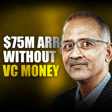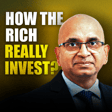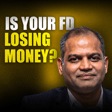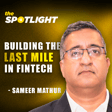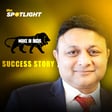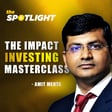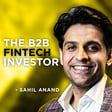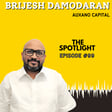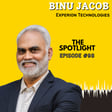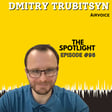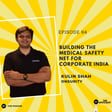
How One Viral Video Saved Our Startup | Bhanu Harish Gurram (Finshots)
"A viral video changed everything for us."
This single event took Bhanu Harish Gurram and his co-founders from the brink of running out of money to securing their first funding check from Zerodha. It's a powerful reminder for every founder that a breakthrough can come from the most unexpected places when you are consistently creating value.
Bhanu Harish Gurram is the co-founder of Finshots, Finception, and Ditto Insurance. An alumnus of IIT Roorkee and IIM Ahmedabad, Bhanu turned down a pre-placement offer from Amazon to build his vision. Today, his daily financial newsletter, Finshots, reaches over 500,000 subscribers, and his insurance advisory platform, Ditto, has advised over 300,000 users and sold more than 30,000 policies.
Key Insights from the Conversation:
- Problem-First Approach: The ventures evolved sequentially, each tackling a more refined version of the initial problem: making finance simple and accessible for the average Indian.
- The Content-to-Commerce Flywheel: Finshots builds a massive, trusting audience with free, high-quality content, which then serves as a low-cost acquisition funnel for Ditto Insurance, their primary monetization engine.
- Monetize Trust, Not Content: The team made a deliberate choice not to put their content behind a paywall, instead choosing to monetize the trust they built by offering ethical, advisory-led services.
- The Power of a Strategic Partner: The early and consistent backing from Zerodha provided not just capital but immense credibility and philosophical alignment, proving crucial to their success.
- Building an "Anti-Pattern" Brand: The ventures were consciously designed to counteract the negative practices of their respective industries—jargon, mis-selling, and spam—thereby creating a powerful brand differentiator built on transparency.
Chapters:
(00:00) - From Local College Dreams to IIT
(02:26) - Life at Nestlé & The Decision for an MBA
(07:39) - Rejecting an Amazon Offer to Start Up
(12:18) - The First Venture: The Rise and Pivot of Finception
(24:17) - "We Were Running Out of Money"
(31:31) - How a Viral Video Led to Zerodha Funding
(38:11) - Launching & Scaling Finshots to 500k+ Readers
(42:49) - The Long-Term Vision: Creating Ditto Insurance
(50:52) - The "Why": Personal Stories That Built the Mission
(58:07) - The Challenges of Hiring and Scaling a Team
Hashtags:
#Finshots #DittoInsurance #BhanuHarishGurram #FounderThesis #StartupIndia #Fintech #Insurtech #IIMAhmedabad #Zerodha #Entrepreneurship #ContentStrategy #ContentMarketing #Bootstrapping #VentureCapital #IndianStartups #FinancialLiteracy #StartupJourney #AkshayDatt

